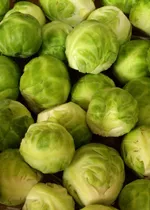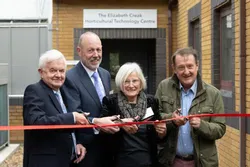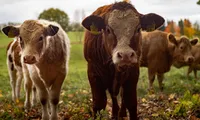Life Sciences News
See our Latest Journal Publications
University of Warwick's bean grower Andy Ward grapples with impacts of torrential rain
Lincolnshire farmer Andy Ward, known for cultivating the first British Baked Beans in partnership with University of Warwick scientist Eric Holub, is facing a harsh reality as standing waters inundate his farmlands.
Press Release (5 January 2023)
Warwick Agri-Tech ploughs the future of farming and forestry with robotics
The University of Warwick announces Warwick Agri-Tech to help the future of farming with automation – addressing issues such as labour shortages, food insecurity and loss of biodiversity.
Warwick Agri-Tech, will also support the UK to meet climate targets while enabling the production of enough nutritious food for the growing population. It will combine two world class faculties at WMG at The University of Warwick and the School of Life Sciences (SLS), working with the High Value Manufacturing Catapult to spearhead automation in areas such as horticulture, crops and forestry.
Press release (21 December 2023)
British grown baked beans ‘in the can’
The first ever commercial crop of British-grown baked beans have progressed to the tinning phase, a pivotal step in their journey orchestrated by Professor Eric Holub. It is hoped that the baked bean breakthrough will reduce the reliance on imports.
Press Release (29 November 2023)
The enigma of embryonic development: how certain animals trim their genomes
New research by Professor Andre Pires da Silva is underway to decipher a fascinating biological puzzle—how some animals can naturally discard more than half of their genetic information during embryonic development. The new study is part of the BBSRC Pioneer Awards, which could revolutionise our understanding of the rules of life. Sixty two researchers across the UK, including Professor Pires da Silva, are to receive a share of £12 million to pursue visionary bioscience research.
Press Release (9 November 2023)
Researchers to benefit from £18 million investment in world-class frontier bioscience
Researchers at The University of Warwick are among four world-class teams receiving a share of £18 million to pursue transformational bioscience research programmes. The School of Life Sciences team will investigate the bacterial cell wall – which could help to develop new classes of antibiotics, tackling the global challenge of antibiotic resistance. The project is led by Professor David Roper in collaboration with Dr Séamus Holden, Professor Phill Stansfeld and Dr Stephen Cochrane (Queen's University Belfast).
Press Release (29 September 2023)
The University of Warwick celebrates the successful harvest of "GODIVA" and ‘OLIVIA’ – two novel dry beans inspired by local cultural history.
Researchers at Warwick Crop Centre have celebrated the successful harvest of a homegrown bean developed to thrive in a British summer.
Press Release (9 September 2023)
Professor Eric Holub and research fellow Rosanne Maguire discuss the novel bean varieties on BBC CWR.
National Organic Month: Warwick Crop Centre's pioneering research into low-input farming
During National Organic Month, the University of Warwick's Crop Centre takes a pioneering stance in the realm of low-input farming, shedding light on the concept of 'organic farming.'
Press Release (1 September 2023)
Robocrop: The robot assistants helping farmers to increase productivity
The future of farming could involve robots– as farmers seek to address labour shortages and increase crop yields.
Warwick Crop Centre and WMG are working in close collaboration to combine their robotics expertise and plant science expertise to investigate how they can apply autonomous robotics to greenhouses and croppable fields.
Press Release (25 August 2023)
The sound of the underground: What noisy worms tell us about soil health
Researchers are listening to earthworms to monitor soil health, in what could be a major innovation for maintaining soil health. In the first study of its kind, scientists are using a technique called ecoacoustics to listen to the activity of earthworms and other invertebrates in the soil. The theory is that a noisy soil is a healthy soil – and that the sounds generated in soil can be recorded, measured and used to evaluate soil condition. Press release (14 July 2023)
Jackie was interviewed about the research by David Gregory-Kumar for BBC Midlands Today.
Watch the interview (16 July 2023)
Historical medicine suggests a new way to use modern treatments
Combining honey and vinegar could be an old, yet new, way of treating persistent infections. The mixture of honey and vinegar, also known as oxymel, has been used as a medical treatment throughout history and now scientists have established that this combination could have modern applications in the treatment of wounds. New research by Dr Erin Connelly, Dr Freya Harrison and team, published in Microbiology, is the first comprehensive exploration of how the mixture could be applied to modern medicine and improve treatments for infections.
Press release (13 July 2023)
Helping plants and bacteria work together reduces fertiliser need
Today, published in Microbiome, Dr Beatriz Lagunas and colleagues at the Universities of Warwick and Justus Liebig (Germany) have shown a new way to boost plant nutrient uptake and growth. This could reduce the need for fertilisers, an input to agriculture which can be harmful for the environment. Fertilisers can run into waterways, or get broken down by microbes in the soil, releasing the potent greenhouse gas nitrous oxide into the atmosphere.
Press release (3 July 2023)
The first British Baked Beans could be on the breakfast menu thanks to University of Warwick research
Professor Eric Holub, a plant scientist at Warwick Crop Centre, has developed Haricot bean varieties which can be sown in early May and harvested as a dry grain before mid-September, matching the UK's warmer months. Until now, it has been impossible for farmers to grow the haricot variety used for baked beans in the UK because they are incompatible with the climate.
Press Release (16 June 2023)
The story was also on BBC Breakfast. Watch it on iPlayer (from 22m 30s)
New discovery stops bacterial virus contamination
A new discovery by Dr Antonia Sagona and colleagues could help stop bacteria being contaminated with viruses, reducing disruption and decreasing costs in industry and research.
Press Release (18 April 2023)
A “zinc” in the armour: could metal help combat common superbug?
A new study has shown that zinc plays a key role in a hospital superbug, that doctors struggle to treat due to its resistance to antibiotics.
Press Release (15 February 2023)
Bacteria communicate like us – and we could use this to help address antibiotic resistance
Like the neurons firing in human brains, bacteria use electricity to communicate and respond to environmental cues. Now, researchers have discovered a way to control this electrical signalling in bacteria, to better understand resistance to antibiotics.
In the study published in Advanced Science, Dr Munehiro and colleagues, report a major step forward in regulating bacterial electric signals with light.
Press Release (13 February 2023)
Scientists reveal why sprouts taste better as you get older… and why your grandparents were right all along
 Researchers from Warwick Crop Centre are sharing food for thought about the humble sprout this Christmas and tell us:
Researchers from Warwick Crop Centre are sharing food for thought about the humble sprout this Christmas and tell us:
• Why having a gene mutation makes sprouts taste horrid
• Why sprouts taste better after frost
• Why they make us gassy
Press release (15 December 2022)
£1.5m Crop Research Centre opens at University of Warwick
 A facility using gene-editing technology to improve quality, resilience and sustainability of vegetable crops has opened at the University of Warwick.
A facility using gene-editing technology to improve quality, resilience and sustainability of vegetable crops has opened at the University of Warwick.
The Elizabeth Creak Horticultural Technology Centre (ECHTC), which also contains The Jim Brewster Laboratory, is a £1.5 million facility which will use cutting edge techniques such as gene-editing to improve vegetable crops.
Addressing issues relating to disease resistance, crop yield, adaptability to climate change and nutritional value in horticultural plants, the research will help with the key global challenges of climate change and feeding the world’s growing population.
Press Release (10 November 2022)
International collaboration identifies new molecular targets in crop resistance
Professor Murray Grant is part of a team of international researchers who have identified and classified new isomers that could help develop more robust and resistant crops – via synthetic biology approaches.
Press Release (4 November 2022)
Scientists develop a new non-opioid pain killer with fewer side effects
 A promising new non-opioid painkiller (analgesic) with potentially fewer side effects compared to other potent painkillers, has been discovered.
A promising new non-opioid painkiller (analgesic) with potentially fewer side effects compared to other potent painkillers, has been discovered.
A team of scientists, co-led by researchers from the School of Life Sciences, has investigated a compound called BnOCPA (benzyloxy-cyclopentyladenosine), found to be a potent and selective analgesic which is non-addictive in test model systems. BnOCPA also has a unique mode of action and potentially opens a new pipeline for the development of new analgesic drugs.
Press Release (20 July 2022)
Consider farmers at individual level when controlling livestock disease outbreaks, researchers say
 Livestock diseases will be better managed by incorporating the behaviours of individual farmers into national infection control policies, according to new research.
Livestock diseases will be better managed by incorporating the behaviours of individual farmers into national infection control policies, according to new research.
The findings are the latest from the BBSRC-funded Farmer-led Epidemic and Endemic Disease-management (FEED) project, an interdisciplinary research group including epidemiologists, mathematical modellers, behavioural scientists and veterinarians from the Universities of Warwick and Nottingham. The research is published this week, in the journal PLOS Computational Biology, in a paper entitled “Modelling livestock infectious disease control policy under differing social perspectives on vaccination behaviour”.
Press Release (15 July 2022)
